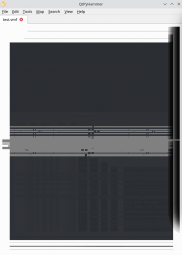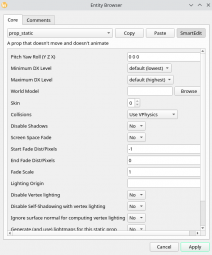QtPyHammer (Strubium)
Jump to navigation
Jump to search

This article has been marked as a candidate for speedy deletion.
If you object to this decision, then please discuss why here (If you make a discussion section also create this redirect page). If this page doesn't meet the criteria for speedy deletion, then please remove this notice, but do not remove it from pages that you have created yourself
Administrators / Moderators - Remember to check if anything links here and the page history before deleting.
If you object to this decision, then please discuss why here (If you make a discussion section also create this redirect page). If this page doesn't meet the criteria for speedy deletion, then please remove this notice, but do not remove it from pages that you have created yourself
Administrators / Moderators - Remember to check if anything links here and the page history before deleting.
| Strubium's QtPyHammer | |
|---|---|
| Type | Open source Third Party Tool |
| Developers | strubium, QtPyHammer Devs |
| Engine | |
| Platforms | |
| ← | |
Strubium's QtPyHammer is a modified fork of ![]() QtPyHammer, an alternative open-source
QtPyHammer, an alternative open-source ![]() Hammer for the
Hammer for the ![]() Source Engine written in
Source Engine written in ![]() Python. This fork adds features that make it a full-fledged editor.
Python. This fork adds features that make it a full-fledged editor.
Features
This fork has all the features of QtPyHammer.
New Features
- Map View and Map Operations toolbar (Unfinished)
- New popup system, replacing Python's command line.
- Texture Browser (Unfinished)
- "Normal" Compile Menu
- Multi-language system
- Support for languages other than English is spotty, but users can submit language translations on the GitHub
- Supports English (Default and the fallback), Spanish, French, German, and Russian.
- More languages can be added if there is demand
Planned Features
- 2D View
- Textured View Mode
- Brush creation and editing
- Hammer Object Properties dialog properly saving data
- Properties menu
- "Advanced" Compile Menu
- Edit timeline (Undo, Redo, etc)
Usage
Todo: It is important to include instruction about configure a myenv there?
There are no downloads released yet, but you run the program by:
- Downloading the source code from GitHub
- Install all dependencies for environment by using
pip install -r Requirements.txt - Running

hammer.pywith Python installed.

